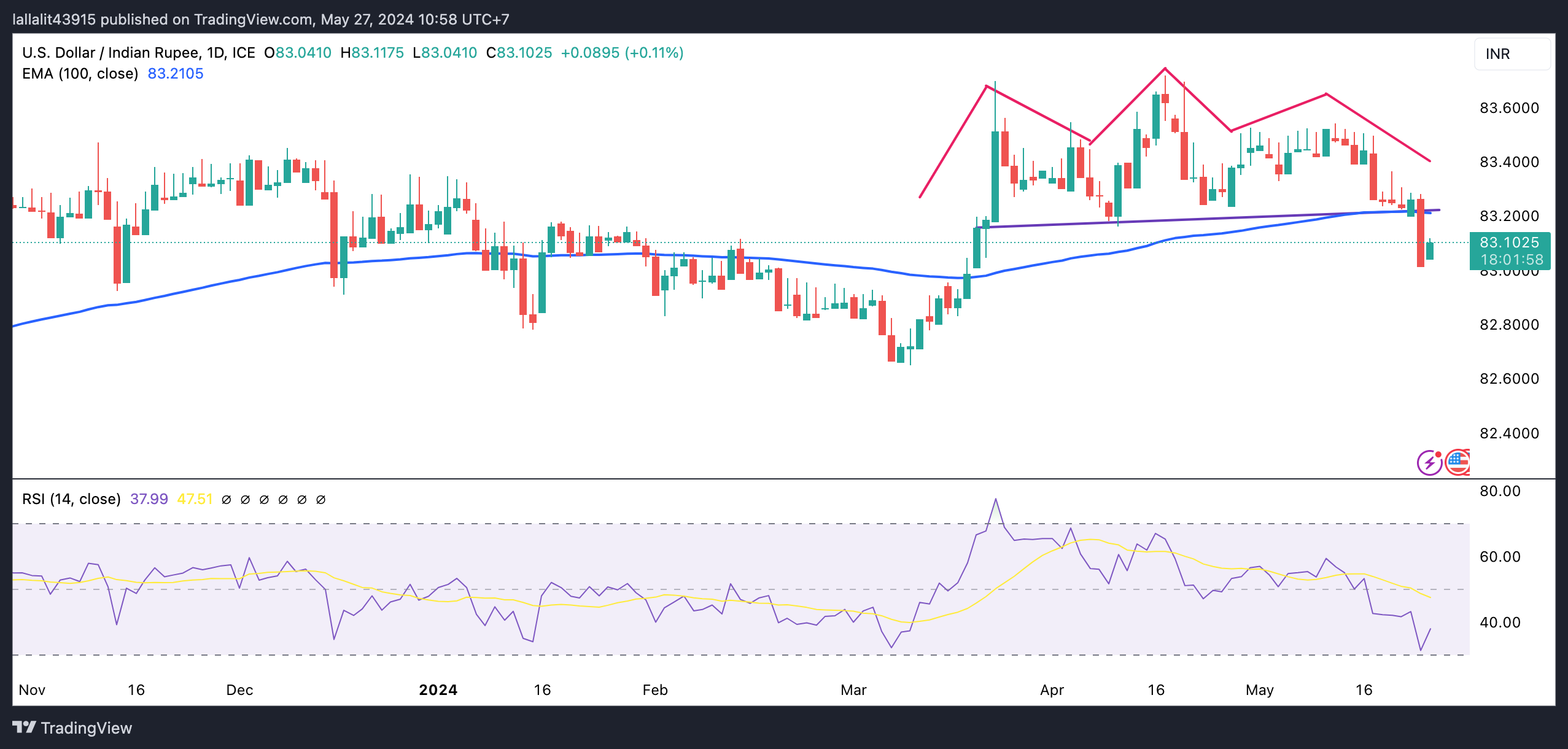USD/INR rebounds amid Middle East geopolitical risks

- Indian Rupee weakens on Monday despite the weaker USD.
- Strong inflows into Indian equities might support the INR in near term; geopolitical risks might cap the local currency’s upside.
- US Q1 GDP, US April PCE and Indian Q4 GDP growth numbers will be closely watched this week.
Indian Rupee (INR) trims gains on Monday despite the softer US Dollar (USD). The INR closed at a two-month high of 83.10 on Friday, marking its biggest weekly gain in over five months, bolstered by strong inflows into Indian equities. The continuing USD inflows into domestic equities could lift the INR in the near term. However, the rise of crude oil prices and safe-haven flows amid the rising geopolitical tensions in the Middle East might boost the Greenback and create a tailwind for USD/INR.
Investors will closely watch the first reading of US Gross Domestic Product (GDP) for the first quarter (Q1) of 2024 on Thursday and the final reading of the Personal Consumption Expenditures Price Index (PCE) for April on Friday. On the Indian docket, the GDP growth number for the fourth quarter of 2023 will be released on Friday. If the Indian economy shows a weaker-than-expected growth, this could weigh on the INR and cap the downside for the pair.
Daily Digest Market Movers: Indian Rupee edges lower amid the cautious mood
- The Indian Rupee strengthened by the most in five months, as India’s benchmark equity indices, BSE Sensex and Nifty 50, touched record highs on Friday.
- After witnessing impressive growth rates of more than 8% for three consecutive quarters, India’s economic growth is estimated to moderate to a four-quarter low of 6.7% in the fourth quarter of 2023.
- At least 35 people have been killed after an Israeli airstrike in the southern Gaza city of Rafah hit tents housing displaced people, the Ministry of Health in Gaza said on Sunday, hours after Hamas launched a barrage of rockets at Tel Aviv for the first time in months, per the Guardian.
- The US Durable Goods Orders climbed by 0.7% MoM in April following a downwardly revised 0.8% advance in March. Economists had expected the figure to decrease by 0.8%.
- The University of Michigan Consumer Sentiment Index fell to 69.1 in May from 67.4 in April. Meanwhile, inflation expectations for one year rose slightly to 3.3% from 3.2%, while five-year inflation expectations dropped to 3% from 3.1%.
- Financial markets see the probability of unchanged rates rising to 46% from 35% a week earlier, according to CME’s FedWatch tool.
Technical analysis: USD/INR resumes a bearish picture on the daily chart
The Indian Rupee weakens on the day. The USD/INR pair confirms a breakout of the neckline of the Head and Shoulders pattern that formed since March 21. The pair resumes a bearish
US Dollar price today
The table below shows the percentage change of US Dollar (USD) against listed major currencies today. US Dollar was the strongest against the Swiss Franc.
| USD | EUR | GBP | CAD | AUD | JPY | NZD | CHF | |
| USD | -0.01% | -0.04% | -0.03% | -0.16% | -0.08% | -0.12% | -0.02% | |
| EUR | 0.01% | -0.03% | -0.03% | -0.14% | -0.09% | -0.11% | -0.01% | |
| GBP | 0.04% | 0.03% | 0.00% | -0.12% | -0.05% | -0.09% | 0.02% | |
| CAD | 0.03% | 0.03% | 0.00% | -0.12% | -0.05% | -0.09% | 0.03% | |
| AUD | 0.14% | 0.15% | 0.12% | 0.11% | 0.06% | 0.03% | 0.13% | |
| JPY | 0.08% | 0.07% | 0.06% | 0.02% | -0.06% | -0.03% | -9894.86% | |
| NZD | 0.12% | 0.12% | 0.08% | 0.07% | -0.03% | 0.04% | 0.11% | |
| CHF | 0.01% | 0.00% | -0.02% | -0.02% | -0.13% | -0.07% | -0.11% |
The heat map shows percentage changes of major currencies against each other. The base currency is picked from the left column, while the quote currency is picked from the top row. For example, if you pick the Euro from the left column and move along the horizontal line to the Japanese Yen, the percentage change displayed in the box will represent EUR (base)/JPY (quote).
